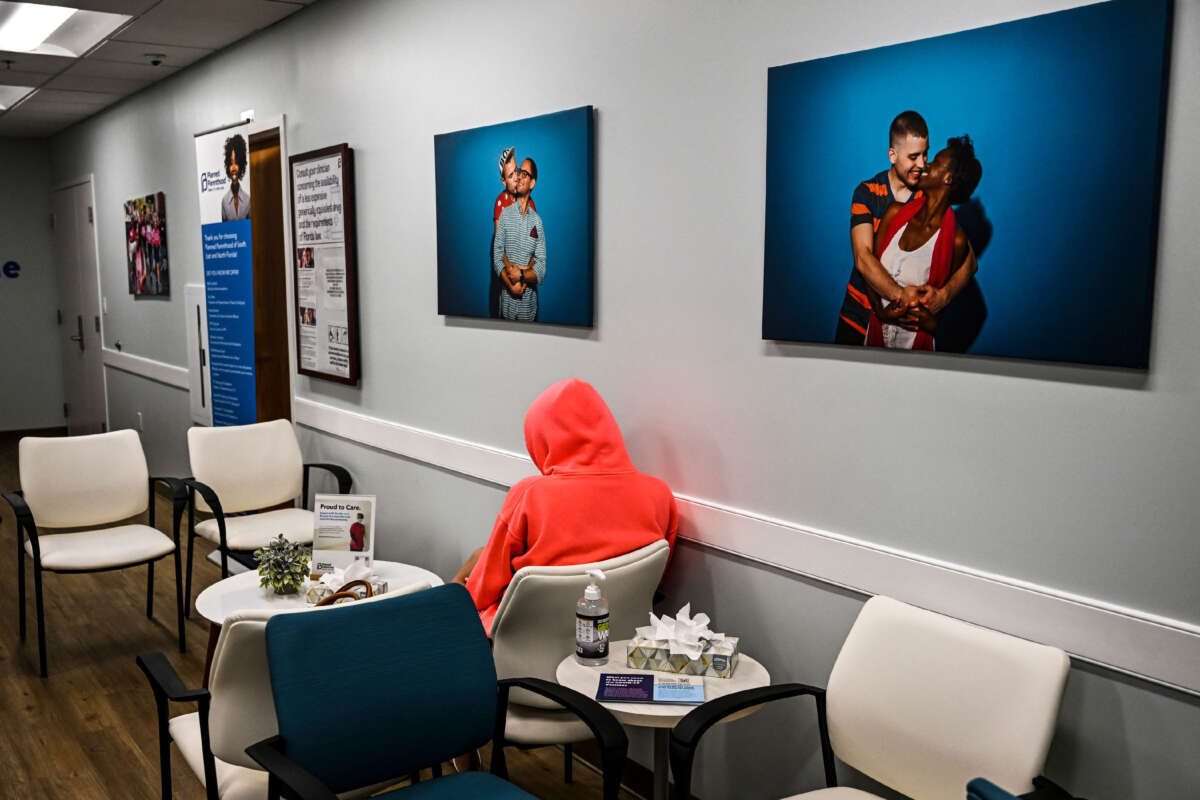A Republican lawmaker in Florida has introduced a bill that would ban abortion past six weeks of pregnancy — legislation that, if passed, would effectively eliminate most abortion access in the South.
Republicans hold supermajorities in both the state’s Senate and House of Delegates, and Gov. Ron DeSantis, who is visiting early primary states in advance of an expected presidential run, has vowed to sign any “great life legislation.” It’s a commitment he reiterated when asked about a six-week ban, specifically.
The six-week ban, introduced by Republican state Sen. Erin Grall on Tuesday, includes exceptions for rape or incest up to 15 weeks of pregnancy. To qualify, a person must have a copy of a restraining order, police report, medical record, or other court order or documentation proving the pregnancy was a result of rape or incest. The legislation would also bar the use of state funds to help a pregnant person leave the state to obtain an abortion. The bill was introduced on the first day of Florida’s legislative session.
Abortion is already outlawed in Florida for anyone past 15 weeks of pregnancy — a measure also introduced by Grall — with no exceptions for rape or incest. (There is a nominal exception to save the pregnant person’s life, though doctors have said it is vague and difficult at best to utilize. Another exception exists if the fetus has a fatal anomaly, though it brings similar challenges.) It’s a restriction that medical providers in the state note is not based on any medical reasoning. Though most abortions occur before 15 weeks, that law has still meaningfully curbed access, clinicians in the state say. Prior to the ban taking effect this past July, most Floridians who sought abortions past that point could not afford to come to a clinic earlier, were minors who in some cases did not realize they were pregnant, and people who discovered complications late in pregnancy — even if they were not guaranteed to be fatal.
A six-week ban could have a far more significant impact, radiating far beyond Florida. People often do not know they are pregnant at six weeks. The first sign of pregnancy is often a missed menstrual period, which a pregnant person typically will not notice until they are around four weeks, at the earliest.
Laura Goodhue, executive director of the Florida Alliance of Planned Parenthood Affiliates, criticized the bill, saying it would hurt people who get pregnant and their children, especially in Black and Latinx communities.
The bill “means many pregnant people will never have the option to have an abortion,” Goodhue said in a statement. “Moreover, between the 24-hour mandatory delay and two appointment requirements, even patients who realize they are pregnant before six weeks may be unable to access abortion care before they run out of time.”
In the months since Roe v. Wade was overturned, the Sunshine State has emerged as a haven for people in the South seeking abortion. The procedure is outlawed almost completely in Alabama, Arkansas, Louisiana, Mississippi, Oklahoma, Tennessee and Texas and banned after six weeks in Georgia. That limits abortion access in the South to Florida, North Carolina and South Carolina, where a six-week ban was struck down by the state Supreme Court last year.
None of the three providers in South Carolina performs abortion past 14 weeks. About a dozen abortion clinics operate in North Carolina, where close to 30,000 abortions took place in 2020. In Florida, the nation’s third-largest state, more than 60 clinics provide abortions.
Already, Florida’s large network of clinics has seen a surge in patients. Last year alone, 6,708 people from out of state got an abortion in Florida, about 8 percent of the 82,192 abortions done there. That represents a 37.7 percent increase in out-of-state abortions from 2021. Abortion clinics, particularly in northern Florida, which is closer to the Georgia border, have said they are seeing twice as many patients as before, with a large share coming from out of state.
If a six-week ban passes in Florida, it will likely end the state’s status as a refuge, creating too short a timeframe for people from out of state — who, upon learning they are pregnant, typically need to find a clinic, make an appointment, and coordinate money and logistics for travel, lodging and potentially child care. Those efforts can take weeks, as seen last year when Texas and Oklahoma both enforced six-week abortion bans even prior to Roe’s overturn.
That would put more pressure on clinics in the Carolinas, but it’s unclear how long abortion will stay legal there. In South Carolina, which is governed by a Republican trifecta, lawmakers are working to pass a new ban on the procedure. A change in makeup of the state’s Supreme Court — the loss of its sole woman justice, who had voted to strike down the state’s six-week ban — could increase the odds of an abortion prohibition being upheld.
In North Carolina, the state’s Democratic governor has indicated he would veto an abortion ban. But statehouse Republicans are one vote shy of a veto-proof majority, and one Democratic legislator has suggested openness to voting for some kind of abortion ban. Lawmakers there are currently weighing what type of restrictions to push for this year and are also considering a six-week ban.
Media that fights fascism
Truthout is funded almost entirely by readers — that’s why we can speak truth to power and cut against the mainstream narrative. But independent journalists at Truthout face mounting political repression under Trump.
We rely on your support to survive McCarthyist censorship. Please make a tax-deductible one-time or monthly donation.
